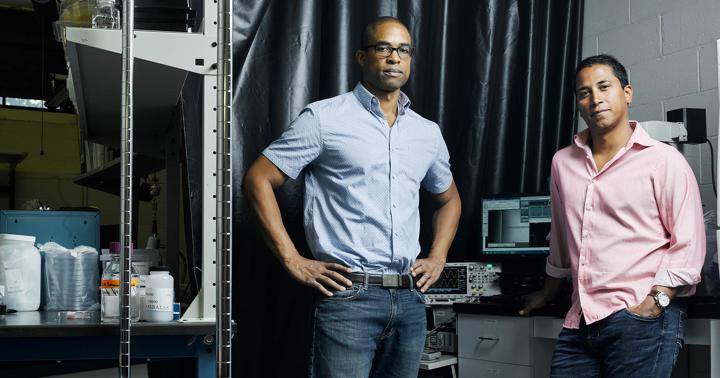
Blog post: February 3, 2021
Kytopen co-founder Professor Cullen Buie studied mechanical engineering, first at Ohio State, then at Stanford. After landing a faculty job at MIT in 2009, he turned his research focus from microfluidic pumps for automotive fuel cells, to microbial fuel cells—devices that harness cell metabolism to create electricity.
But, six months into his new post, tragedy struck. His 35-year-old sister died of sepsis. “It was mind-boggling to me that in 2010 people still died of bacterial infections,” Buie told The Scientist.
That’s when he had an epiphany. He could shift his focus exploring how electrical fields influence the outer cellular envelopes of bacteria, to research that might prevent others from dying of diseases like sepsis. That is, the tools he was developing to understand bacterial cell walls could be applied in fields like synthetic biology to create new drugs and gene-modified cell therapies.
When researchers genetically engineer microorganisms to create new drugs or other products, one of the first steps can be the hardest--getting new DNA into a cell.
As Paulo Garcia, Kytopen co-founder and CEO told Fast Company, “There’s been tremendous advances in writing DNA, tremendous advances in reading DNA, and tremendous advances in analyzing the data from the sequencing. But the step where you actually put the DNA into the cells has been a bottleneck.”
So Garcia (then a postdoctoral researcher in Buie’s lab) and Buie set out to change that. They spent four years devising a system that makes the process of inserting nucleic acids into cells hundreds of times faster than the current state of the art.
In 2017, they co-founded Kytopen, setting up shop at The Engine. Two years later they came to MassVentures seeking funding to help them commercialize their product—a system that combines continuous fluid flow, electric fields and automation to make the process of gene transfer faster and more cost-effective.
MassVentures awarded Kytopen a “Stage I” $100,000 grant through our Small Business Innovation Research (SBIR) Targeted Technologies (START) program in 2019. The funding allowed the Kytopen team to sell their product by attending conferences, trade shows, and working with partners to scale up production. While such activities are critical for startups seeking to raise capital and grow, SBIR grants don’t cover those expenses. MassVentures’ START program is designed to bridge critical gaps like this one.
The following year, Kytopen applied for additional funding from START, and MassVentures awarded the startup an additional $200,000 to continue commercializing their technology. MassVentures also led the company’s seed funding round in Fall 2020.
Since receiving its initial START award, Kytopen has gone on to raise $3.6 million in venture capital. And in January 2020, Kytopen signed a deal with Cambridge Consultants to co-develop its FlowfectTM system. FlowfectTM streamlines the engineering of a wide array of human and human-derived cells for use in next-generation cell therapies, with the goal of expanding access to powerful, new living medicines.
Kytopen is one of 85 such startups to benefit from MassVentures’ START non-dilutive grant program over the past 9 years. The $25.2 million that we’ve awarded these companies has leveraged $2.5 billion in follow on capital and created or retained 2,500 jobs in the Commonwealth.
MassVentures is accepting Stage I applications for our 2021 START program through February 28.
Massachusetts-based deep tech companies that have received SBIR/STTR phase II funding are eligible to apply. (Deep tech represents substantial scientific and engineering advancements, including but not limited to AI, robotics, synthetic biology, quantum computing, IoT.)
To learn more, or apply, visit https://www.mass-ventures.com/start-program
“The MassVentures START program was critical for the accelerated development of our high-throughput discovery platform to unlock next-generation cell therapies,” said Garcia.
Photo: Cullen Buie and Paulo Garcia in their lab at The Engine headquarters. Photo by Doug Levy, courtesy of The Engine.
